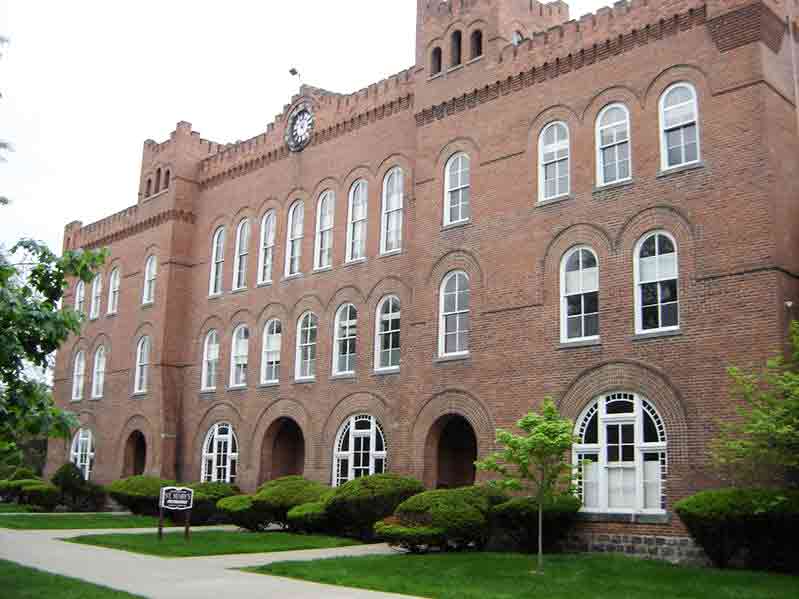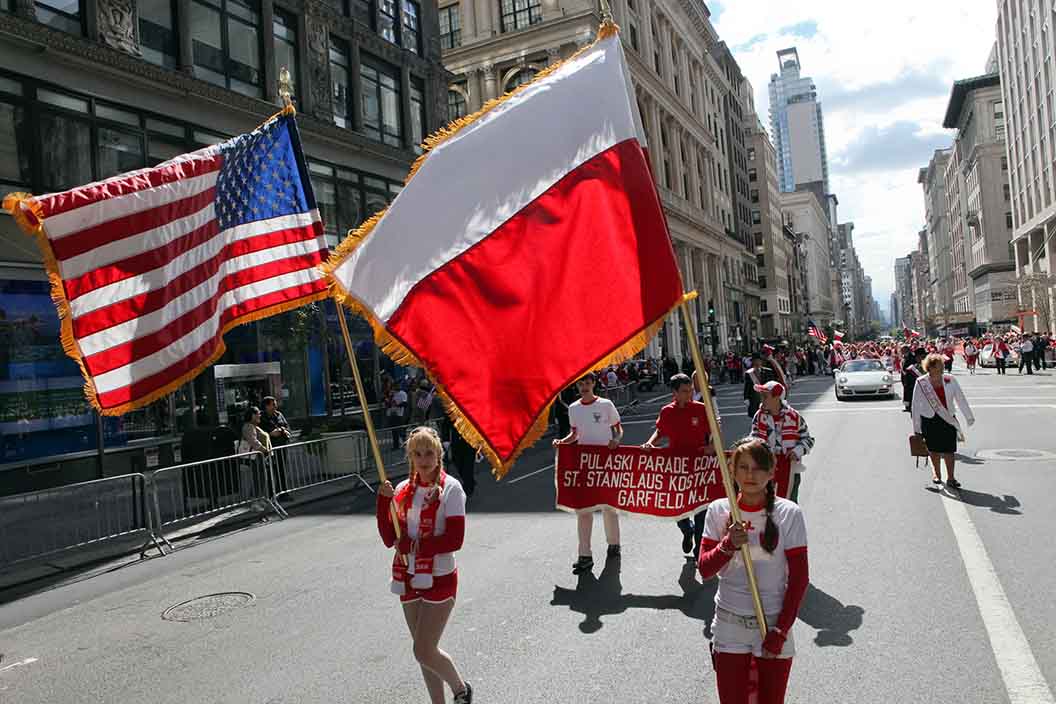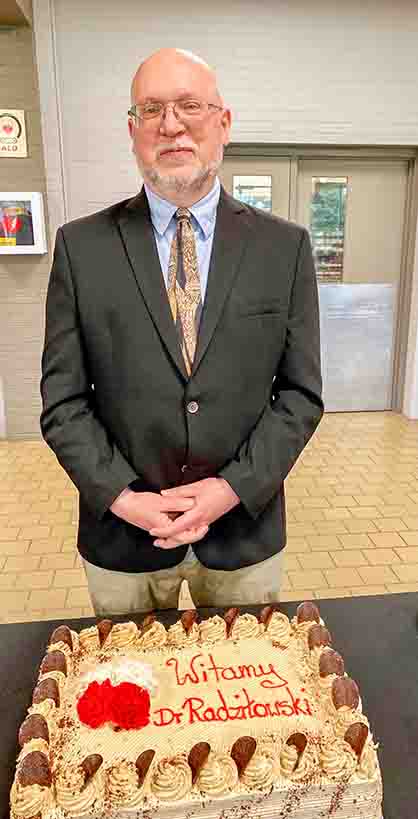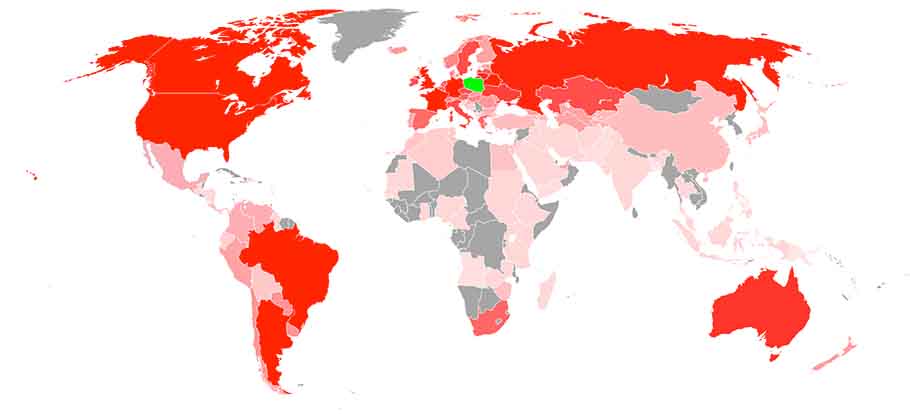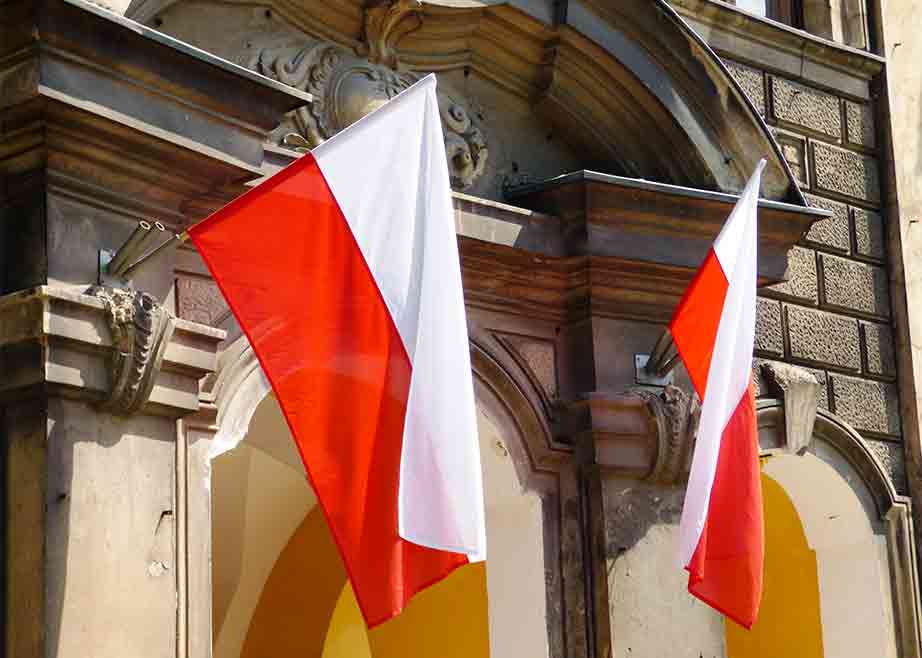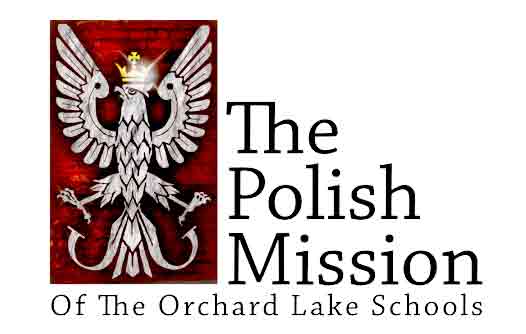It was supposed to be so beautiful...
October is a Polish National Heritage Month in the USA. It began with a huge scandal in Michigan. It was supposed to be so beautiful. Chairs to the right for special guests: Consul General of the Republic of Poland in Chicago Dr. Paweł Zyzak, Honorary Consul of the Republic of Poland in Detroit Richard Walawender, Bishop Robert Fisher of the Archdiocese of Detroit, Fr. Dr. Bernard Witek director of the Institute of St. John Paul II at Orchard Lake Schools (OLS). The ceremony was hosted by the director of the Polish Institute at OLS, Dr. John Radziłowski. In the center, a bust of general Józef Haller. The unveiling and consecration of the monument was preceded by a Holy Mass for the fallen soldiers, presided over by Fr. Bernard Witek (the would-be chancellor of the now dissolved seminary). The bust of General Haller is a gift from the Institute of National Remembrance in Poland. On the left, scouts, members of the SWAP, i.e. descendants of those volunteers who left America to fight for a free, sovereign Poland. Then the audience, donors and all those who care that Polishness is not erased from Orchard Lake...
Polish and American anthems were played and sung, which meant that what was happening on the left side was not noticed. There, the local police arrested Janusz Roland, a longtime Polish community activist and former member of the supervisory board of the Orchard Lake Center.
The image of an elderly man kneeling and handcuffed, while singing the Polish national anthem, accompanied by American policemen, during a patriotic ceremony, in the presence of the Consul General of the Republic of Poland, a local bishop and other VIPs, went out into the world. Despite many scandals having already surfaced around Orchard Lake over the years, yet another has been triggered.
This is how the month of Polish National Heritage in Michigan began. Is it a deliberate action to completely obliterate Orchard Lake? Such a thesis was put forward by Mr. Gutowski from TVN.
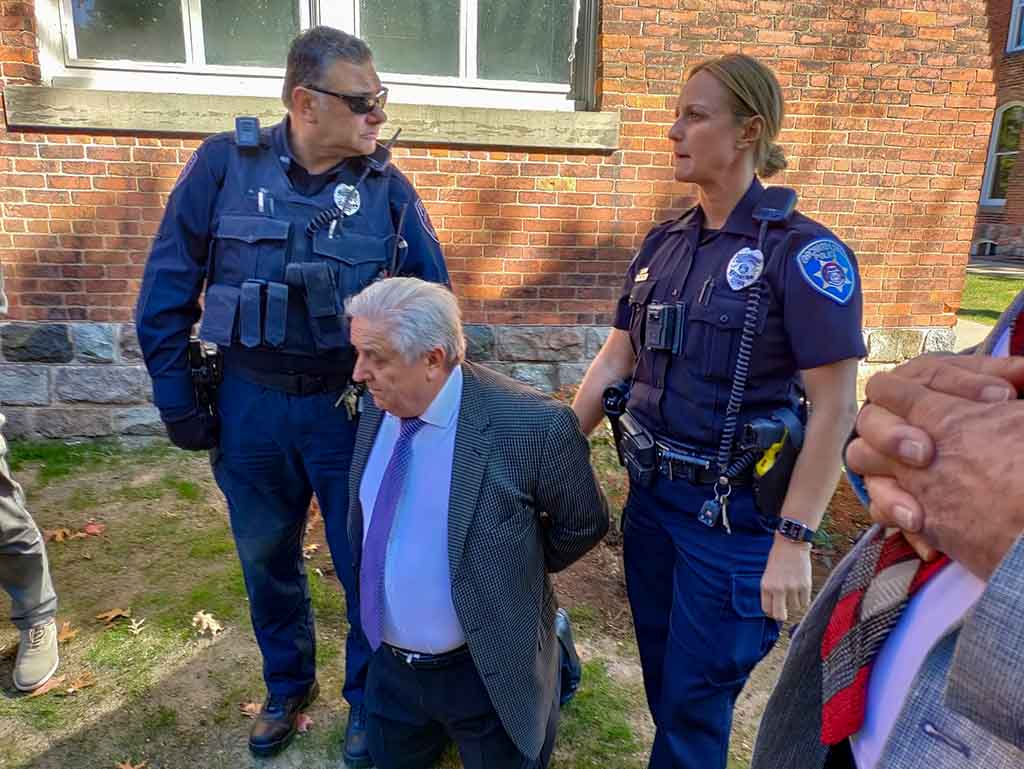
The arrest of Janusz Roland (Source: Facebook)
Why is this center so important to Polish national heritage? At Orchard Lake, Fr. Józef Dąbrowski founded the Seminary of St. Cyril and Methodius, which — in 1885 — were transformed into the Scientific Institutes. The heart of this campus was the seminary established on January 4, 1879, with the permission of Pope Leo XIII, after an earlier petition issued by Fr. Leopold Moczygemba — the founder of the first Polish settlement of Panna Maria in Texas. For decades, this entire scientific complex was an intellectual center for the Polish American community and provided Polish parishes in America with Polonia leaders and parish priests. Then there was a school for boys that was enjoyed for many decades. There was also a college run by the father of the current director, but that is another story.
Dr. John Radziłowski, the director of the Orchard Lake Institute, says:
We have an extremely rich collection of Polish art, mainly of the nineteenth and twentieth centuries, including artists such as Malczewski and Stryjeńska. It is probably the largest Polish art collection outside of Europe. We have letters and documents from Polish kings from the 17th and 18th centuries as well as rare books and coins. Of course, we have many documents and collections related to the history of the American Polonia. This includes documents, photos and artifacts collected by Polish veterans of World War II (The Home Army, II Corps, Polish Air Force), as well as survivors of German and Soviet terror. An important element of the collection is the history of Polish parishes and clergy in the USA, as well as of the Catholic faith, which results from the particular history of our institution.
What do local critics say?
From long conversations with the poet and doyen of Polish journalism in the USA, Edward Dusza (Polish emigration poet, prose writer, literary critic, journalist, publisher, political emigrant — in the USA since 1969 — called the last bard of Polish independence and military emigration) exhibits of Polish national heritage have been irretrievably lost from Orchard Lake or have even been stolen. Edward Dusza himself was a longtime associate of Orchard Lake.
Dr. Mirosława Maria Kruszewska (poet, journalist, literary and theater critic, publisher, researcher of the literature of Polish emigration and the history of Polish emigration in America, doctor of humanities) deals ruthlessly with the problem of theft in the article: Who stole Chagall's painting? " (link below the article).
They were both decorated by President Andrzej Duda with the Officer's Cross of the Order of the Polish Revival Polonia Restituta — the second most senior Polish civilian decoration, awarded for outstanding achievements in the field of education, science, sport, and culture.
The huge number of artifacts flowing to Orchard Lake over the decades and the lack of their proper inventory and archiving meant that anyone who was there could easily receive a gift from the management in the form of a painting, sculpture, coin, or an antique print. At last, there appeared a chance to change this state: a new leader, and so it happened. However, there was no open competition, the people in leadership selected prof. dr. John Radziłowski as director of the Polish Mission, which name was changed into the Polish Institute of Culture and Research in Orchard Lake Schools, Michigan.
I myself interviewed the professor for Kuryer Polski about his intentions and was his ardent supporter. To date, however, the complex has not been audited and all the collections have not been inventoried. At least, there is no public information about it.
How much Polishness is left in Orchard Lake?
This question is asked aloud by a group of Polish volunteers gathered in the "Polish Lobby" group on Facebook. They have been fighting for a long time to preserve Polishness in all parts of this great center.
The relations between the individual parts of this complex are not very transparent. There is the Council of Regents behind every decision, but nowhere on the extensive website is there any trace of them. My lawyer friend, while analyzing this site, confirmed my fears. One can find individual documents and the famous open letter to the Polish diaspora with the signature: Stephen M. Gross, Chairman, Board of Regents, but it is not known who that is and what merits he has vis-a-vis the Polish diaspora. Who is on the Council of Regents? How many Americans of Polish descent are on the Council of Regents? How many people are there who have nothing to do with the Polish community? Are their decisions in line with the interests of the Polish ethnic group and the Orchard Lake Schools itself?
There is no more Polish language in high school, Polish is eliminated from the website, decisions are not communicated to the Polish diaspora. Another question arises here: Does Orchard Lake push the Polish community to the sidelines, depriving it of the actual right to influence Orchard Lake? All these leaders are deprived of the basic ability to communicate with the outside world, depriving the Polish diaspora of any influence on any decisions. Polishness in Orchard Lake is shrinking at an alarming rate, which is why the Polish Lobby was established to stop the progressive de-polonization of Orchard Lake.
Old Polonia — New Polonia
This is the most complicated relationship. New Polonia understands Old Polonia just like Melchior Wańkowicz understood it, i.e. as an open-air museum: kiszka, cabbage rolls, pierogi, sausage, and polka.
The old emigration often considers the New Polish Diaspora, who speaks with an accent, as people of a "different category", although the level of education of both groups indicates a much better education of the new emigration, which is also better prepared to play a culture-forming role in the USA.
According to the old one, the new Polish diaspora is supposed to sit quietly, write checks, and wait for the decisions of people who do not always have the required knowledge of Polish diaspora and Polish culture.
Although specialists from Poland who are missing in the USA will still be coming to the United States - well educated, speaking many languages - does Old Polonia have any offer for them apart from pierogi and polka?
A perfect example is the famous Polish center in Panna Maria, in Texas, built to the tune of several million dollars. There are no hotels or restaurants there. The competition for the director of the center, despite two candidates with doctorates — Americans of Polish origins — was won by an American of Mexican origin, without a doctorate, because she did not speak with a foreign accent.
When analyzing the life of the Polish community centers run by Americans of Polish origin, it can be easily noticed that the program offers are dominated by: kiszka, polka and pierogi. Polishness in American universities is shrinking at an alarming rate. The number of Polish departments, once so popular in the Midwest, drops to zero with the retirement of Polish professors. It is not known how many parish schools did not resume operation after the pandemic. There are no such schools in Wisconsin anymore.
Polish exhibits, whether they be books or valuable collections, need to be saved, as prof. Donald Pienkos demonstrated. He saved a collection of negatives from the 1920-40s in Milwaukee, which was to be put in the trash, which — now digitized — is a pearl of the local history of Polish people in Wisconsin.
What will Polonia be like in 20 years?
The old Polish diaspora will probably no longer exist, as the length of human life has its own rules. Most of the leaders of the old Polish diaspora do not want to introduce any changes or open up to the new Polish diaspora. In each photo of the meetings of the old Polish community, the average age of leaders is between 65-75 years. Most of them do not speak Polish, and some believe that they do not need Polish for anything.
The Polish language is a fundamental pillar of Polish culture. If we cannot see it, we will be like a candle in the wind. Communication with Warsaw is almost non-existent in some centers. Interest in Polish diaspora centers in other countries is null. After the natural departure of the leaders, there will be a void that probably cannot be filled anymore.
Professor Mazurkiewicz from Texas says: "There is one Polish diaspora", but is it really? Until the old Polonia starts treating the new Polonia as an equal partner, which is a chance for the continued further existence of this important ethnic group, for its development, we as Polonia will disappear into non-existence forever.
The heist of Polonia cash
Since its inception, the Polish community has been one of the largest church builders in the United States. There are dozens of examples of churches built by Polish immigrants now being sold, often to raise funds to compensate for sex scandals. We remember the battles for Polish churches in Chicago, for example, the campaign to defend the church of St. Wojciech before its sale. There are dozens of such situations throughout the United States.
All artifacts from Polish churches can be found in private collections and in antique stores. I myself was involved in a situation where in one of the antique stores in Taos, New Mexico, I discovered a large collection from Polish churches in Milwaukee.
Groups of crooks are trying to take over Polish houses, funded by veterans, in several European countries. Similar situations take place in the USA. Large organizations also sell goods inherited from Polish emigrants. Buildings, building plots, artifacts. I wonder how much the area where Orchard Lake is located is valued? I know some investigative journalists want to address these issue. On the scale of the entire Polish community, these are billions of dollars — a significant part of Polish heritage in the world — which should serve the Polish diaspora, fund scholarships for talented youth, and finance Polish initiatives in the USA.
Bilingualism and acculturation as a chance for development
According to the research of prof. Stercula from Colorado State University, 95% of American Poles were born in the United States. In the last census, as many as 8,969,530 admitted being of Polish origin — not under a compulsion, but fully voluntarily.
Research has clearly shown for several decades that the Polish ethnic group is better educated than the average American. 43.5% have at least a college degree or higher compared to the US average of 33.1%. It is a great hope for the future for Polish community organizations and the government in Warsaw.
There are as many as 20 million people in the world who are proud of their Polish origin. All these people represent a huge potential that needs to be combined in order to serve in the world as the image of Poland and Polish culture, science and art. For the Polish diaspora in the United States to develop, it is necessary to create a new Polish diaspora policy both in Warsaw and in some intellectual center in the United States, the foundation of which should be the following elements: effectiveness, connecting Polish diaspora in the world, connecting Polish diaspora with the country, acculturation, i.e. the ability to function in both cultures and bilingualism, which is to facilitate mutual communication with other Polish diaspora groups around the world. And for this we need the Polish language: for the communication of the Polish diaspora in the world. English won't solve it
Polish is the language of communication of the Polish community.
How to resolve the conflict in Orchard Lake?
Credibility, transparency and respect for people — these are the keys to conflict resolution. The Polish community has the right to know who the regents are and what interests they represent. What is the procedure for selecting regents? What are their achievements and qualifications to represent the interests of the Polish community at Orchard Lake? Perhaps the Council of Regents should also include recognized representatives of the Polish community from all over the United States? Every table, chair, and piece of equipment, the ground on which the buildings stand, and finally — the artifacts, works of art, book collections, i.e. the achievements of decades, morally belong to the entire Polish diaspora, which provided and contributes funds for this Polish project.
Hiding behind legal gibberish will never release the Polish community from moral responsibility for the fate of Orchard Lake. It is worth showing a bit of empathy, credibility, transparency and respect for people in this respect, and this is the way to solve problems. Threatening with lawyers and the police are the worst methods of communicating with the Polish diaspora. Those who do not understand this should leave their posts.
This is what Americans of Polish origin in Michigan are fighting for: to guarantee the Polish nature of Orchard Lake and to stop the de-polonization that is progressing there. The task of the leaders of both groups is to meet and reach an agreement as soon as possible, and not to escalate the conflict. I believe that Polish diplomats can act as mediators in this conflict. As a journalist, I am asking the Polish and Polish media to disseminate the matter and help in extinguishing this conflict.





